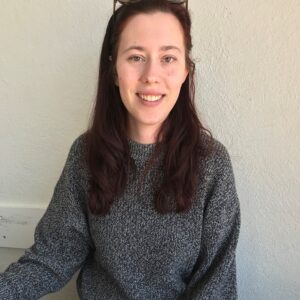Marie-Claire Harrison, a graduate student in the Department of Biological Sciences, has been named the 2023 recipient of the Brighter Ventures Student Award.
The Brighter Ventures Student Award supports Ph.D. students interested in the application of artificial intelligence in the biomedical research field. This award was established by Laurent Audoly, a graduate of the Department of Pharmacology and a member of the School of Medicine Basic Sciences Board of Visitors, and his wife, Olga Granaturova.

“Marie-Claire is a superbly talented, hard-working, and very smart graduate student with a strong interest for research in the broadly defined area of ‘evolutionary and functional genomics’ and a stellar record of training and prior research experience,” Antonis Rokas said. Rokas is Harrison’s Ph.D. advisor, the Cornelius Vanderbilt Professor of Biological Sciences, and the director of the Evolutionary Studies Initiative.
Harrison’s research explores the relationship between genotype and phenotype using a unique dataset that contains the genomes of nearly all known species in the Saccharomycotina fungal subphylum, as well as their qualitative and quantitative growth profiles on different carbon and nitrogen substrates.
Recognizing that machine learning could help mine the dataset, Harrison led efforts to create three data matrices that could be studied with machine learning: a genomic data matrix, a metabolic data matrix, and an environmental data matrix. After training an algorithm on these matrices, Harrison was able to predict the growth of different species on specific substrates—a phenotypical characteristic—based on presence/absence patterns of genes—a genotypic characteristic—and patterns of growth on other substrates.
Harrison has validated the use of this data set and has used it to explore other aspects of yeast metabolism.
“Machine learning is a powerful tool for investigating the evolution of the genotype-phenotype map in Saccharomycotina yeasts that can help uncover novel biology even in well-studied traits,” she said.
Thanks to Harrison’s leadership on this project, the Rokas lab now employs her machine learning expertise and the algorithm she developed to explore a variety of aspects of yeast ecology and evolution. These approaches add to the powerful, albeit slower, evolutionary approaches exclusively used in the Rokas lab prior to Harrison’s arrival.
“Over my 16 years as faculty, I have come to appreciate how in every generation of trainees in my laboratory there is one or two trainees that change our way of doing things, whether by asking a new question, bringing in a new technique, or expanding our way of thinking,” Rokas said. “Marie-Claire’s efforts in showing us the power of machine learning for investigating the evolution of the genotype-phenotype map in yeasts is one of the most transformative for our research program.”